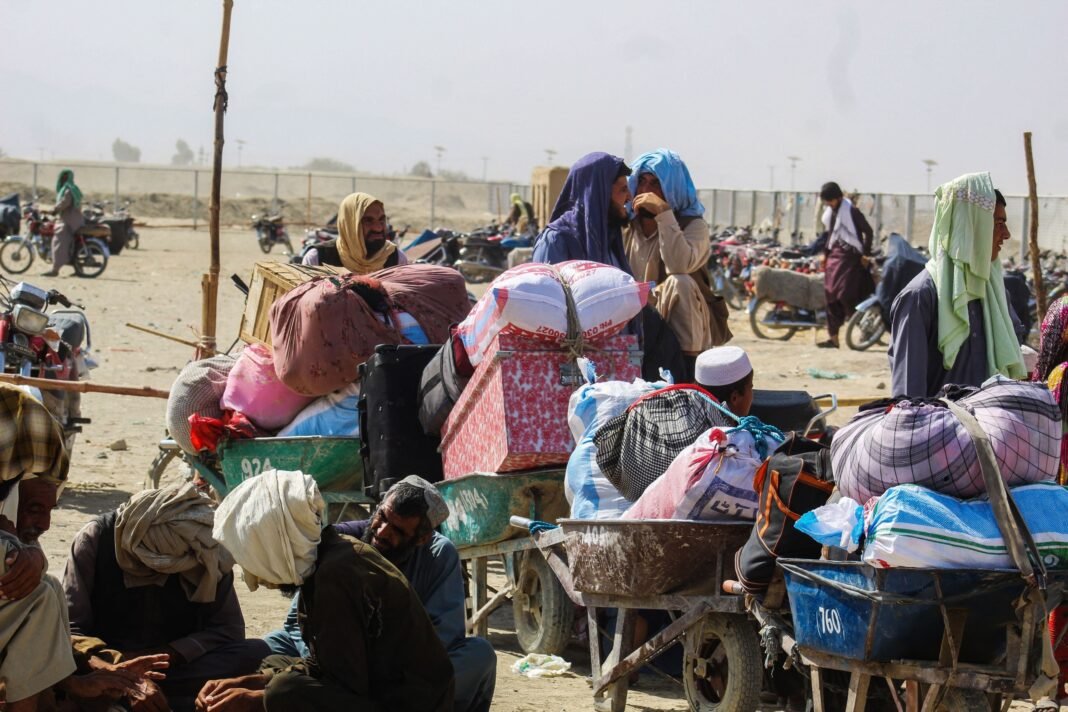Sania Sajjad
Pakistan’s interim government, citing domestic law, announced plans to deport undocumented Afghan nationals under the “Illegal Foreigners Plan of Repatriation.” Announced on October 3rd, 2023, the plan initially set a deadline of November 1st for Afghans to leave the country. However, this deadline was recently extended to February 29th, 2024. Refugees remaining after this date will be subject to fines.
According to the United Nations High Commissioner for Refugees (UNHCR), approximately 450,000 refugees returned to Afghanistan in October 2023.
Over 1.7 million undocumented Afghan refugees reside in Pakistan, primarily concentrated in the provinces of Khyber Pakhtunkhwa (KPK) and Balochistan, according to the UNHCR. Roughly 50% are located in KPK, while 24% reside in Balochistan. This influx has created tensions between the refugees and local communities, particularly regarding access to land, food, and water resources.

Growing resource demands and security concerns have fueled tensions between Afghan refugees and local residents in Pakistan. This discontentment intensified after the TTP cross-border attack in Chitral, highlighting potential security risks. While millions of registered Afghans remain, the deportation drive targeting undocumented refugees reflects the government’s attempt to address these challenges amidst an already strained economic and security situation.
However, the impact of refugees on the host country is complex. While their economic activities like low-wage labor benefit certain sectors, they can also disadvantage local workers and contribute to inflation, especially affecting those with fixed incomes. Ultimately, balancing economic interests with addressing genuine concerns of both communities remains a key challenge.
Concerns have been raised regarding tax compliance among Afghan merchants in Pakistani cities. Reports suggest that some of these merchants operate without the necessary documentation, which may lead to them unintentionally or intentionally avoiding their tax obligations, creating a significant burden on the country’s fiscal health. This missing revenue, particularly in major trading hubs like Peshawar, widens the gap between legal businesses and informal markets, leading to unfair competition and jeopardizing tax collection efforts.
This situation disproportionately impacts local taxpayers and legitimate businesses who comply with regulations, contributing to financial inequalities. Encouraging undocumented merchants to fulfill their tax obligations is crucial to establishing a more equitable and sustainable economic landscape for everyone.
The impact of Afghan migrants on Pakistan’s economy is complex, with both positive and negative aspects. While the introduction of livestock like camels, cows, and donkeys has demonstrably impacted the local meat and milk markets (e.g., by increasing supply and potentially affecting prices), other economic consequences require nuanced consideration. Refugee assistance programs and international aid have generated varied effects, creating jobs and funding infrastructure projects in some areas while potentially contributing to informal market growth in others.
Pakistan navigates a complex tightrope act, balancing the influx of Afghan migrants with both potential benefits and drawbacks.
Recent moves, like processing cost reductions, reflect attempts to adapt to this evolving reality. While hosting refugees certainly brings challenges – economic strains, security concerns, and environmental pressures – it’s not without its upsides. These migrants can contribute to local economies, bolster certain sectors, and even enrich communities through cultural exchange. Hence, balancing the complex interplay of positive and negative outcomes associated with Afghan migration is crucial for the region’s health.
The presence of Afghan refugees in Pakistan presents a complex situation with multifaceted economic and social implications. Efforts to manage irregular migration are one aspect of a broader focus on ensuring national stability and development. These measures underscore the intricate relationship between government policies and refugee hosting, showcasing both benefits and drawbacks, notably in terms of economic and security implications. Such considerations are crucial for developing nations to manage the multifaceted challenges associated with hosting refugees.
*The author is an International Relations graduate from the International Islamic University, Islamabad. Her research focuses on maritime security and contemporary global issues.
**The opinions in this article are the author’s own and may not represent the views of The Diplomatic Insight. The organization does not endorse or assume responsibility for the content.
The Diplomatic Insight is a digital and print magazine focusing on diplomacy, defense, and development publishing since 2009.



